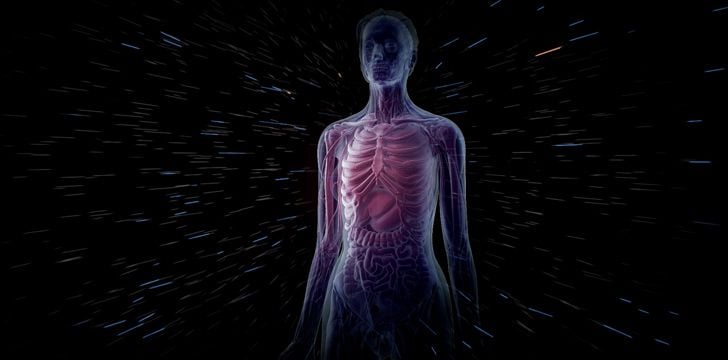The human body is an amazing thing, but even though we spend all day with ourselves, there are still plenty of things that you probably don’t know about your body.
We’ve compiled a bumper list of interesting facts for you to drop into a conversation and impress your friends!
If you’re a female and you feel like your heart beats quicker than your male counterparts, you’re not wrong. Women’s hearts are proven to beat faster than men’s.
As well as having faster heartbeats, women blink twice as much as men as well.
Hiccups can last a very long time. The record is held by Charles Osborne – this poor man had hiccups for a total of 68 years without stopping!
Around 70% of people tilt their heads to the right rather than the left when kissing somebody else.
Can’t remember your dream from last night? That’s perfectly normal since most people will forget 90% of their dreams.
Humans are able to smell rain better than thanks sharks can smell blood.
It’s not just your cheeks that turn red and expose your embarrassment when you’re blushing. Your stomach also turns red, but not many people will notice this.
Every 3-4 seconds, around 50,000 cells in your body will die and be replaced by new ones.
Fingerprints are unique to each person, making them an amazing phenomenon. Adding to this is the fact that they’re developed within just three months of conception, meaning you were totally unique from the start.
During the average lifetime, your heart will pump a grand total of 182 million liters of blood.
If you’re a man, the smallest cells in your body are sperm cells.
It’s scientifically proven that children grow faster in the spring, so you’re not imagining things when your little nephews and nieces seem to be suddenly older by the summer.
It’s much less effort to be happy – you’ll use 17 muscles to smile vs. 43 to frown and be miserable.
While this can’t be said for everybody, the average person will say around 5,000 words every single day.
If you thought steel was strong and durable, your bones are five times stronger! It’s difficult to break them, but that’s why it hurts so much when you do.
Babies seem to have big eyes since the eyeball never actually grows. On the other hand, your ears and nose never stop growing!
The chances of living to be 100 years old are very slim for most people, and only one out of every two billion people will live to be 116 years old.
Research on heart attacks was carried out, and one of the conclusions was that Monday is the most likely day to have a heart attack – be careful!
No matter how many times you try, it’s impossible to sneeze and keep your eyes open at the same time.
After a long day at work, you will be around 8mm shorter than you were in the morning. If you feel taller when you wake up, it’s because you are.
The average person will have sex 4,239 times during their life.
While you’re flying in an airplane, your hair will grow at twice the rate it usually does. That’s why you seem to need more regular haircuts when you’ve been traveling a lot.
Our taste buds seem to change throughout our lives, but by the age of 60, the average person has lost half their taste buds. This is why older people don’t seem to care as much about bitter or unusual tastes.
Being locked in a totally sealed and closed room wouldn’t cause you to die from a lack of oxygen. You would eventually die from carbon dioxide poisoning.
People burn more calories being asleep than they do by watching the TV. More reason to take a nap!
In your mouth alone, there are more bacteria than there are people in the entire world.
Every 10 years, the human skeleton repairs and renews itself. Essentially, you have different bones now than you did 10 years ago!
Wondering about the largest muscle in the human body? The gluteus maximus wins the prize for that one.
While it’s not the largest muscle, the award for the strongest muscle goes to the masseter, more commonly known as the jaw muscle.
By the time you’re a fully-grown adult, approximately a quarter of all your bones are in your feet.
The amount of bacteria in your entire body is ten times more than the amount of human cells.
Your fingerprints aren’t the only part of your body that are completely unique to you. Your tongue also has a unique pattern and print to it.
Humans are constantly shedding particles of skin throughout the day. You’ll mainly notice this when you get out of the bath or shower. By the time you’re 70 years old, you will have shed around 100 pounds of skin.
Everybody produces large quantities of saliva, and during the average lifetime, a human will have produced around 25,000 quarts of saliva, which is enough to fill two swimming pools!
When you sneeze, it could potentially travel at 100 miles per hour (or even faster!).
It’s not uncommon for your feet to sweat a lot. Every day, your feet can produce roughly one pint of sweat. Ew!
The human brain is very powerful – it uses as much energy as a 10-watt light bulb.
Nobody really knows how many nerve cells there are in the brain. There are so many that it would take you around 3,000 years to count each one.
If you weigh 150 pounds, 21 pounds of this is the weight of your skeleton.
The average person will walk around 100,000 miles during their lifetime. It’s time to start the pedometer!
Think you could spend five years of your life eating? You probably will – if you add up all the minutes you spend eating each day, it will amount to roughly 43,800 hours.
Can you hear your eyeballs moving around in your head? If you can, you’re one of a few people who actually have the ability to do this, and it’s perfectly normal.
If the human brain was spread out as a flat object, it would be roughly the size of a pillowcase.
Have you ever thought about the space between your eyebrows? There’s a name for this area, and it’s called the “glabella.”
Rubatosis isn’t necessarily an illness, but it can be very unsettling for people who experience it. It refers to the intense awareness of your own heartbeat.
We have hair in various places around our bodies, but the fastest-growing is facial hair – that’s why guys have to shave so often.
Men’s hair tends to be twice as coarse as women’s hair. This explains why females usually have much softer and smoother hair than men – it’s because the diameter is about half as large.
Natural blondes usually have more hair than people with other hair colors.
You could remove your stomach, spleen, one lung, appendix, a kidney and still survive perfectly fine.
Being pregnant can cause some weird things to happen. Most women will dream about one or more of three common things during pregnancy – frogs, worms, and potted plants!
If you don’t have blue eyes now, you were born with them. Everybody is born with blue eyes due to the pigment melanin, but the color will change for most people as they grow up.
Approximately 1 in every 2,000 babies already has a tooth when they are first born.
You can’t hear as well if you eat too much. Your hearing is affected by the amount of food you consume, so if you need to hear something well, avoid large meals.
Although you can’t always remember what the smell is, your nose can remember around 50,000 different scents.
While two-thirds of people need to have glasses for either reading or long-distance, the rest of the population has 20-20 vision.
When you die, your hair and nails will stop growing too.
If you haven’t snored for the duration of your life, 60% of men and 40% of women will have started snoring during sleep by the age of 60.
Feel like you need to go to bed? We can survive for much longer without eating food than without sleeping. Personalities may change, and you may find it impossible to function after not sleeping for a day or two.
Sunburn can permanently damage your blood vessels, so make sure you wear sun protection when the sun is out!
Around 90% of illnesses and diseases are either caused or complicated by stress, which is why it’s important to work on reducing stress levels over the course of your life.
Walking uses a total of 200 muscles with every step you take.
No matter how ticklish you are, it’s impossible to tickle yourself since you’re expecting it, and your brain processes it differently.
No other creatures besides humans produce tears of emotion. You may see other animals with tears, but these are not through emotion.
A baby has 99 bones more than an adult. As they grow up, the bones join together, which is why a person ends up with fewer bones.
The largest blood vessel is the aorta. This is just over an inch in diameter.
Your body has lots of iron in it – there’s enough to grow your nails to a maximum of three inches long!
Tiny mites (so small that you can’t see them) are living on your eyelashes and on other body hair.
When your armpits start to smell, it’s not the sweat that causes the nasty odor. It’s actually the bacteria that live in sweaty areas.
If you have blue eyes, you are more likely to have a high tolerance for alcohol. The downside of this is that you are also more likely to become dependent on alcohol and suffer from addiction and alcohol abuse.
The best camera in the world has 200 megapixels, but your eyes would have 576 megapixels if it was a camera.
Each person has approximately 4 pounds worth of bacteria inside and outside their bodies.
Your blood pressure and heart rate can be decreased by listening to relaxing music. Sometimes music is used in hospitals to slow down the heart rate of patients if necessary.
Your brain uses around 20% of the total oxygen and blood in your body.
One million billion pieces of information can be stored by the brain. Now there’s no excuse not to get top marks on your exams!
Your brain is at its peak when you’re in your late 40s. If you haven’t reached that point yet, don’t worry because you’ve got time to get even smarter.
A fever with a temperature of more than 107.5 degrees Fahrenheit is enough to damage your brain significantly and cause death if you don’t seek medical attention.
Contrary to popular belief, the heart is in the middle of your chest, between the right and left lungs. However, it tilts slightly to the left, creating the illusion it is on the left side.
Your brain is developed and created using 50% of your genes. The other 50% of your genes are used for the rest of your body.
On average, fat cells will exist in your body for 10 years before they are replaced.
Every 10 days, your taste buds get replaced. This doesn’t change the way you taste things, although your sense of taste does change over time.
Although many people think shaving causes hair to grow back quicker, there is no scientific evidence for this.
Your little finger is the smallest one on your hand, but it is actually responsible for 50% of your hand strength. Without it, you would notice more difference than losing any of your other fingers.
Out of every 200 people, one person will have an extra rib.
Want to know how to tell if somebody is lying? People blink a lot less while telling a lie and then speed up afterwards.
Phonagnosia is a condition whereby people cannot recognize different voices, no matter how familiar they are with the person. Around 3% of people are born with this.
Cracking your knuckles doesn’t necessarily cause arthritis. If you develop arthritis, it’s most likely because of something else.
If you want to burn maximum calories, go for a run when you first wake up and before you eat anything. Exercising on an empty stomach will burn around 20% more calories.
Humans have fewer genes than a tomato, and worms have just as many genes as humans.
You can recognize a sound in as little as 0.05 seconds, which is less time than it takes to blink.
If you’re a woman and you’re suffering from back pain, wearing a bra won’t reduce this.
Due to the cellulose found in grass, humans are unable to digest it properly. Grass would also wear down your teeth rather quickly.
Your big toe is the most useful one when it comes to moving around – it bears around 40% of your overall body weight.
The human heart beats around 100,000 times every single day.
Red blood cells are responsible for carrying oxygen all over the human body. This is why people with a low blood count often feel tired and fatigued.
There are people of different colors in the world because of the level of melanin in the body. This is something that is passed on through genes.
Babies blink once or twice per minute, compared to adults, who blink around 10-12 times per minute.
On average, the body takes around 12 hours to totally digest food that you’ve just eaten.
The surface area of an adult’s set of lungs is approximately 70 square meters.
Your sense of smell is around 100 times stronger than your sense of taste.
However, the human sense of smell is much weaker than the sense of smell that animals have.
The more we research the human body, the more fascinating it becomes.
The more we learn, the more questions there are. We could go on all day about amazing facts regarding the human body, but we’ll stop at 100!

















